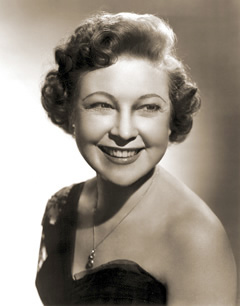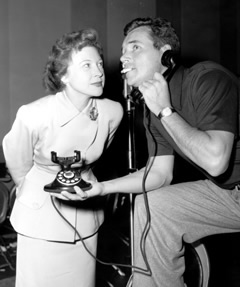

Join Harold Peary as Throckmorton P. Gildersleeve, making a place for himself and his family as he adopts (and adapts to) his new hometown. His family, friends and neighbors are played by Walter Tetley, Louise Erickson, Marylee Robb, Lillian Randolph, Earle Ross, Dick LeGrand, Arthur Q. Bryan, Shirley Mitchell, and more. 16 Episodes on 8 Audio CDs.

|
 MORE DETAILS MORE DETAILS

|

Steely. Seasoned. Smart-alecky. The storied San Francisco snooper is back! Featuring all of the episodes from both our Volume One and Volume Two collections, Howard Duff and Steve Dunne star as Sam Spade in twelve madcap capers from 1946-1951. 12 Episodes on 6 Audio CDs.

|
 MORE DETAILS MORE DETAILS

|
|
 |
|
When Radio Was Spotlight:
AFRA'S FIRST LADY:
The Career of Lurene Tuttle
by Elizabeth McLeod
Anyone who ever talked to an actor who earned a living at a network radio microphone during the Golden Age of Radio came away from the conversation with one strong impression: being a radio performer was a very enjoyable way to make a living.
That wasn't always the case, however. There was a time when networks, sponsors, directors, and producers looked at actors and actresses as so many piles of meat -- to be shoved about, used, and abused at will, with little regard for their own well being. That changed in the 1930s due to a small group of dedicated performers who put themselves on the line to make a difference. One of those performers -- one of the foremost of those performers -- was Lurene Tuttle.
 Lurene Tuttle |
Today she's best remembered by radio enthusiasts for two prominent roles -- she was Sam Spade's efficient, sympathetic secretary Effie Perrine, and she was the first actress to play The Great Gildersleeve's niece Marjorie. But, Lurene Tuttle was far more than the sum of two famous parts. She was one of the giants of West Coast radio drama, an actress whose career spanned the life of her medium, and an activist who helped to forge broadcasting's first successful labor union. Dismiss her as a mere "voice actress" at your peril.
As befits a woman who often played "all-American Girl" roles, Lurene Tuttle was a product of the heartland. Born in Indiana on August 29, 1907, she had show business in her blood -- her father had been a blackface comedian who hunkered down to a humdrum job selling railroad tickets when professional minstrelsy fell into decline in the 1890s. Lurene might have grown up as just another small-town girl had her family not moved westward. Living in the arid town of Glendale, Arizona, Lurene began looking around for something better to do with her time than watching cacti grow, and met local drama coach Mrs. Easley, who gave her her first insights into the difference between merely reciting lines and truly acting. She would carry Mrs. Easley's lessons further westward when she was 15, moving with her family to California. Here she blossomed, becoming active in the school drama club, and coming to the attention of the manager of the famous Pasadena Playhouse, a bastion of semi-professional theatre. Joining the Playhouse stock company gave her the equivalent of a college education in drama, and before she was twenty years old she was a seasoned actress. A short stretch in vaudeville followed, and by the early 1930s she was ready to try something new.
Radio was the coming thing, and the West Coast was awash in dramatic experimentation, especially at the Don Lee Station in Los Angeles, KHJ. Producer/director Lindsay MacHarrie assembled an outstanding stable of dramatic talent, heard both in local productions and over the CBS network. When Lurene Tuttle arrived at KHJ, she fit right in -- a flexible, versatile performer able to handle any role. The KHJ brand of drama insisted upon that flexibility, rehearsal schedules were intense, the demands on a performer were heavy. And, the pay wasn't all that good -- especially since performers were paid only for the actual broadcasts, not the interminable rehearsals.
 Lurene Tuttle and Howard Duff |
To survive in this environment you had to work hard and you had to work long, and Lurene Tuttle did both. But in 1936, Tuttle and colleague Frank Nelson agreed that they needed to do more than just survive. They felt that they deserved a decent wage, dignified working conditions, and professional respect. In the spirit of the times, they were ready to do something about it. They were appearing together on Hollywood Hotel, one of the most glittering programs on the CBS network, for which sponsor Campbell Soup willingly shelled out thousands of dollars a week to guest stars and host Louella Parsons, while tossing pennies to the uncredited players who supported the stars in the weekly dramatic sketches.
Eventually, over a hundred Los Angeles radio actors and actresses united to form the Radio Actor's Guild, an organization that soon evolved into the first chapter of the American Federation of Radio Artists. Lurene Tuttle was one of that chapter's charter members, and would remain a dedicated union activist for the rest of her life.
That life, the life of a radio actress, was only just getting started then. Over the next decade, Lurene Tuttle became one of the busiest women in broadcasting, appearing in hundreds of different roles. She was a regular in all but billing on the prestigious Lux Radio Theatre, appearing in support of a veritable galaxy of film stars, and meeting the man who would become her husband, Lux announcer Melville Ruick. She was a steady performer on the great dramatic anthologies of the time, and by the time she took on the role of Marjorie Forrester on The Great Gildersleeve in 1941 she was approaching her mid-thirties
a seasoned microphone veteran playing a teenager.
Tuttle's Marjorie wasn't a flighty bobby-soxer. She was a high school senior during the program's first season, and Tuttle's no-nonsense portrayal gave the character a level of maturity never approached by any of her successors in the role, projecting a firm lady-of-the-house authority that kept even her pompous uncle in his place. In an era that generally portrayed young women as either demure girlfriends-of-the-hero or manic hoydens, Lurene Tuttle gave Marjorie a sense of dignity that would remain with the character for the entire run of the series.
Tuttle's other great radio role also maintained her dignity, but had more of a comic edge than Marjorie. As depicted in Dashiell Hammett's original novel The Maltese Falcon, Sam Spade's secretary Effie Perrine displayed an odd, almost matronly longing in her relationship with her employer. Director John Huston allowed a bit of that to filter through in actress Lee Patrick's performance in the classic 1941 film. But, when William Spier brought Sam Spade to radio in 1946, he had a broader approach in mind -- and he knew that Lurene Tuttle, with whom he'd often worked during his years at the helm of Suspense, was just the actress to take that ever-so-slightly maternal attitude toward Sam and give it a bit of a comic twist without turning the performance into a caricature. Effie loved Sam, in her own way, but that love was not unlike the love of a bemused mother for an exasperating child. Her portrayal of Effie wasn't all that different, really, from another Tuttle performance -- as the long-suffering mother of Red Skelton's Mean Widdle Kid. Effie knew that Sam would get into some ridiculous predicament each week, she knew that he'd somehow get himself out of it, and she knew that everything would go on just like always. She could be patient with his antics, because she knew that she could count on him, in the end, to always do the right thing.
Sam Spade left the air in 1951 when radio was already on its way out the door, given the brushoff by the arrival of television. Lurene Tuttle had dabbled in movies, and she'd go on to play many character roles on television over the next three decades but, she never established the reputation for versatility on TV that she had enjoyed in radio. A middle-aged woman would never get a chance to offer a nuanced portrayal of an eighteen-year-old girl in a visual medium. Lurene Tuttle was still a fine actress on television -- but being on screen limited her to what she looked like, not what she could actually be. Tuttle's TV career usually found her cast as either a gentle authority figure (a nurse, a teacher, a mother) or as a gossipy small-town meddler. Variations of these roles found her appearing in everything from suburban situation comedies to courtroom dramas to Westerns. Her television work extended into the mid-1980s before age and illness finally caught up with her.
Lurene Tuttle's first love remained radio, and throughout her career she tutored and trained up-and-coming microphone performers. She bristled at the idea that radio acting was simply a matter of doing voices, and she had little use for the idea of mere voice acting. "You have to have a person who lives and breathes and walks and is alive, rather than just turning on a voice," she insisted. "You could conjure up, through imagination, anything you wanted to be."
An appropriate benediction for The First Lady of Radio.
© 2013 Radio Spirits and Elizabeth McLeod. All rights reserved.
|
|